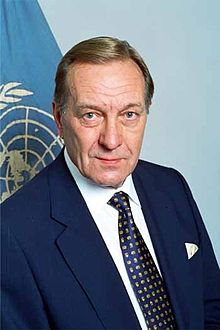Harri Holkeri
Harri Hermanni Holkeri [ ˈhɑrːi ˈhɛrmɑnːi ˈhɔlkɛri ], Valtioneuvos (born January 6, 1937 in Oripää , † August 7, 2011 in Helsinki ) was a Finnish politician and from 1987 to 1991 Prime Minister of his country. In 2000/2001 he was also President of the UN General Assembly .
Life
Holkeri graduated from political science with a master's degree in 1962 . As a teenager he joined the conservative National Collection Party ( Finnish Kansallinen Kokoomus ), of which he became chairman in 1971 at the age of 34. He was the youngest Conservative party leader in Europe. Holkeri resigned the chair in 1979 and initially left politics to get involved in the National Bank of Finland (1978-1997). After several years in Helsinki local politics , he won the 1987 general election and became Finland's first Conservative Prime Minister since World War II . Holkeri formed a grand coalition with the Social Democrats and other, smaller parties. His liberal attitude and his sense of duty were formative for his reign, which lasted until 1991. Holkeri ran twice (1982 and 1988) for the office of Finnish President .
From 1995 to 1998, Holkeri was a member of the international commission ( The International Body ) from neutral states, headed by George J. Mitchell , which mediated the Northern Ireland conflict and had a major influence on the conclusion of the Good Friday Agreement in 1998.
In 2000 he was elected President of the UN General Assembly and held this office until 2001. From 2003 to 2004 he headed the UN mission in Kosovo .
Holkeri successfully completed several marathons . He had been married to Marja-Liisa Lepistö since 1960, with whom they had two children.
Honors
- Valtioneuvos , 1998
- Honorary Knight Commander (KBE) of the Order of the British Empire , 1999
- Commander with the Star of the Order of Merit of the Republic of Hungary , 1993
Web links
Individual evidence
- ↑ Helsingin Sanomat (Finnish)
- ^ Obituary in the British Guardian, August 16, 2011 , accessed August 16, 2011
| personal data | |
|---|---|
| SURNAME | Holkeri, Harri |
| ALTERNATIVE NAMES | Holkeri, Harri Hermanni (full name) |
| BRIEF DESCRIPTION | Finnish politician |
| DATE OF BIRTH | January 6, 1937 |
| PLACE OF BIRTH | Oripää |
| DATE OF DEATH | August 7, 2011 |
| Place of death | Helsinki |

